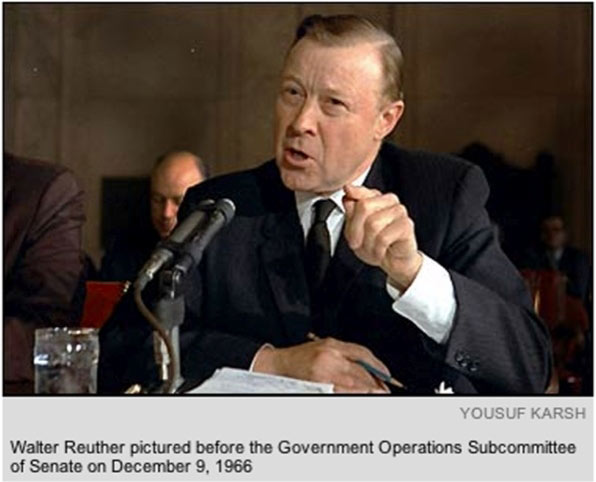
On February 20, 1967, Walter Reuther, President of the United Auto Workers, AFL-CIO, testified before the Joint Economic Committee of Congress, calling for employee stock ownership as a way for workers to gain their income increases out of the bottom line without raising costs to business.
Profit sharing in the form of stock distributions to workers would help to democratize the ownership of America’s vast corporate wealth, which is today appallingly undemocratic and unhealthy.
[Extracted from Page 774 of Part 4, Hearings, The 1967 Economic Report of the President, Joint Economic Committee, Nineteenth Congress, First Session.]If workers had definite assurance of equitable shares in the profits of the corporations that employ them, they would see less need to seek an equitable balance between their gains and soaring profits through augmented increases in basic wage rates. This would be a desirable result from the standpoint of stabilization policy because profit sharing does not increase costs. Since profits are a residual, after all costs have been met, and since their size is not determinable until after customers have paid the prices charged for the firm’s products, profit sharing [through wider share ownership] cannot be said to have any inflationary impact on costs and prices.
Click here for full text [outside link] of Walter Reuther’s 1967 testimony before the Joint Economic Committee of Congress
The following page references present other key statements by Walter Reuther in his 1967 testimony, including his support of Kelsonian methods for democratizing to all citizens the ownership of corporate wealth and new technology, as the basis of a healthy and just economy.
p.732 (last line) “I raised the profit-sharing concept in this testimony this morning not as it relates to that specific proposal that we made in 1958. I raise it with respect to a broader consideration.”
p.736 “If you look at the income distribution, you see that it is being distorted very dangerously. This is not just a matter of economic justice. The economy won’t work, it will break down, if we don’t find a more equitable way to share the abundance
of our new technology.”
p.740 government power
p.748 Reference to his role as chairman of the Citizens Crusade Against Poverty (CCAP) and Ford plan to train 1000 workers thru CCAP. [Note: CESJ’s President Norman G. Kurland, served as the Director of Planning for the CCAP during Reuther’s tenure and helped introduce Louis Kelso’s ideas to that organization.]
p.749 ownership
p.751 Federal Reserve and “access to new money”
p.756 Start of written testimony by Reuther
p.757 democratization of ownership of industry
p.763 property incomes
p.774 shares of stock for democratization of ownership
p.780 Federal monetary policy and tax increases
p.792 End of Reuther testimony